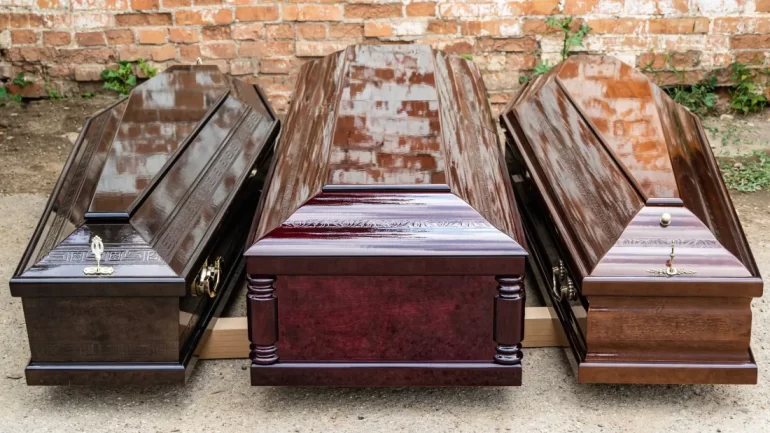Neil Serven
It was varnish day at the casket factory. On the sidewalk he was holding Evelyn’s hand when they caught a surprise whiff of polyurethane. They could see other faces scrinch as they approached it—acrid, though not unpleasant. Like when your father was up to something in the cellar: it was comforting to know work was being done.
At the restaurant they were told their table wasn’t ready, so they bought cigarettes and walked to the Veterans Monument, where buskers were playing. The odor from the factory clung to their hair and clothes.
Evelyn said death was a low-risk investment. Everyone will become a customer. They’ll always need caskets. How do they know which varnishes to use? Like, how many mahogany? How many cherry? Not everyone wants a cherry casket. You make too many and then you’re waiting for enough people to die who want cherry.
He thought to respond that markets correct themselves. If nobody buys your cherry, then you lower the price until you’ve sold off your inventory.
He worried that this sounded like explaining. He was thrilled by Evelyn. Being with her caused him to see colors he hadn’t seen in a long time. She was his age, widowed like him. Both spouses had died in frightful accidents—forklift, hot tub—and until he met Evelyn he hadn’t thought to consider death as anything other than tragic, something that carved out a hole. Sarah’s death had carved out a hole in him.
But to Evelyn, death was its own uncanny presence. It showed up like a clown in a horror film, it rendered you ridiculous, it could make any word a last word, even if that last word was sponge. All you could do was laugh at it.
Instead, he replied, I don’t like cherry, personally. He meant the actual fruit. He meant jubilee.
You’re too old for cherry, she joked, astonishing him.
We want death to be opulent, Evelyn said. That’s why we buy caskets. It’s out of guilt that we allow ourselves greater luxury in death than in life. We want to be remembered like the royalty we never were.
It’s a kind of projection, he thought to say.
What there won’t always be, she said, is space in the ground to bury everyone. It’s simple math. Whoever came up with the cockamamie idea of putting boxes in the ground didn’t plan ahead. The population is growing exponentially. Eventually we’ll run out of real estate. And then what? Not everyone will have their chance at opulence.
She had to raise her voice to climb over the chorus of the buskers. Kids were singing Bob Dylan. It amused him—kids still liked Dylan. He fished in his pocket for change to toss casually into the guitar case lying open in front of them, but he found none. Then he pulled out his wallet, but it contained only a single twenty-dollar bill. He quickly closed the wallet and returned it to his pocket, hoping Evelyn wouldn’t notice him stiffing the kids.
Perhaps by then we’ll have moved on to other planets, he said eagerly.
She sat on the granite bench and crossed her legs, her hand on her maroon stockinged knee, her cigarette burning. The names of soldiers who perished in World War I were etched in columns on the polished slab behind her. He saw his own last name, which was not a common name. It shocked him to see it. He hadn’t been aware of any ancestors who died in the war.
In angst he told her, I’d like one of those green burials. I want them to make me into fertilizer. Grow a tree out of me. Use the wood from my tree to build casks for brandy, or a grand piano. A chessboard shared by old men in the park.
He was trying not to look at his name on the monument. Evelyn had her face cast downward, the cigarette left to burn in her fingers.
The varnish became concentrated again and soon everyone around them—buskers, pedestrians—had to stop to wipe their eyes.
In the middle of dinner, Evelyn excused herself to use the restroom and then didn’t text him until she was safely home.
He thought of his ancestor, his Great War namesake, ended in a trench, piled into a boxcar with the other dead, dog tag in a pocket. War made for the uncanniest of deaths. Death led to someone you didn’t know being paid to etch your name, your name that people always spelled wrong, so people could read it when they went out for a smoke.
It’s for the best we don’t see each other again, the text said. Her texts were always complete sentences, punctuated flawlessly, emoji-less. They were works of art.
He finished his drink and paid the bill. The waitress, from her pitiful expression, knew what had happened.
When he was outside again, the streetlamps were lit and the smell from the varnish was gone. The cool of the dusk disappointed him.
He stabbed letters on his phone screen, asked what he did wrong. His texts sounded overexposed, threatening, precisely the man he had determined not to be. Question mark, exclamation point, beseeching—it was never going to be fair.
Later she replied, You don’t see how cruel and unfeeling you are.
He texted back, question mark, question mark. Is this about the buskers? He really didn’t know.
She replied, you gave me merchandise. You wish only to linger and haunt. I wanted to know how you would transcend.
Neil Serven’s stories and essays have appeared or are forthcoming in Washington Square, Catapult, Rain Taxi, Post Road, Ploughshares online, Greensboro Review, and elsewhere. He and his wife, Hillary, own and operate Federal Street Books in Greenfield, Massachusetts. Follow him on Twitteere at @neilserven.

